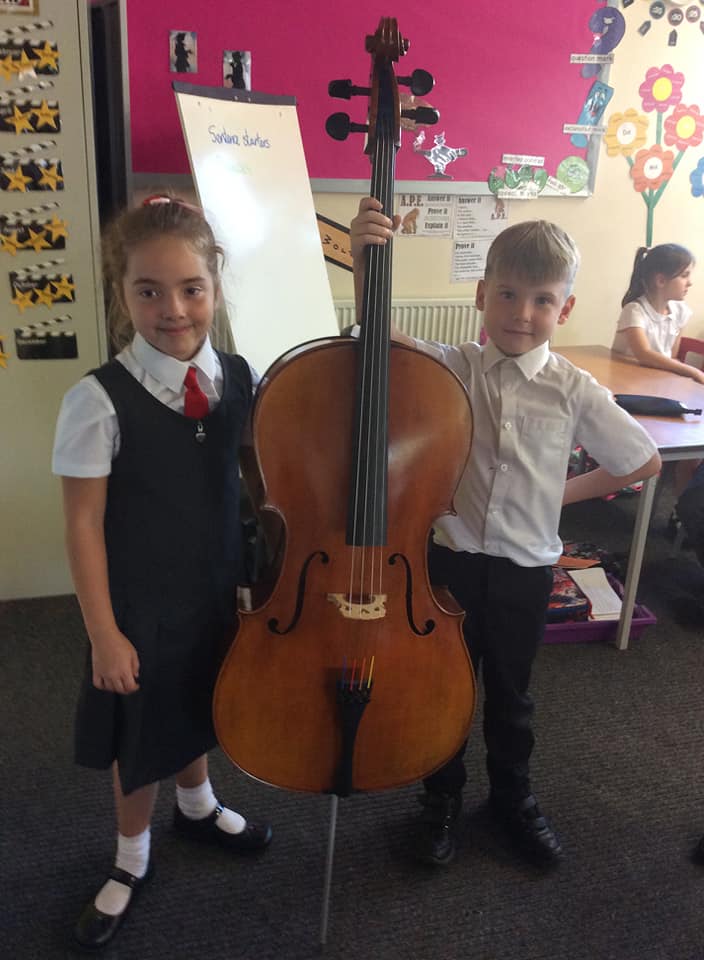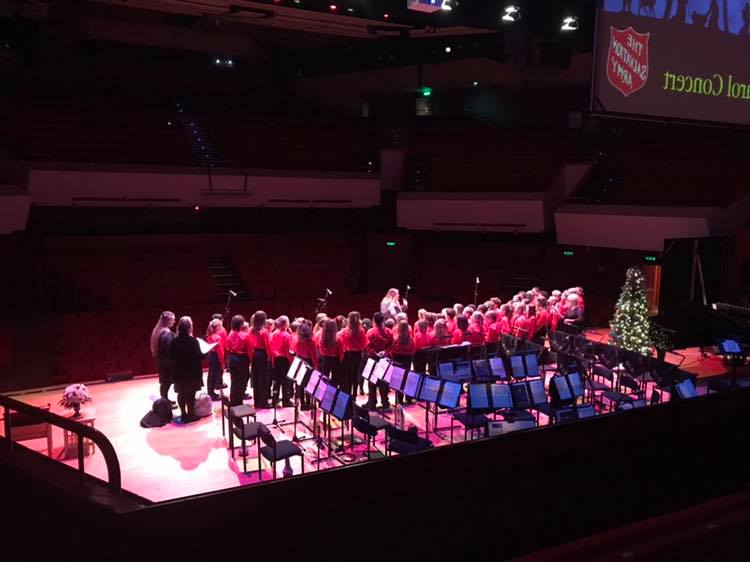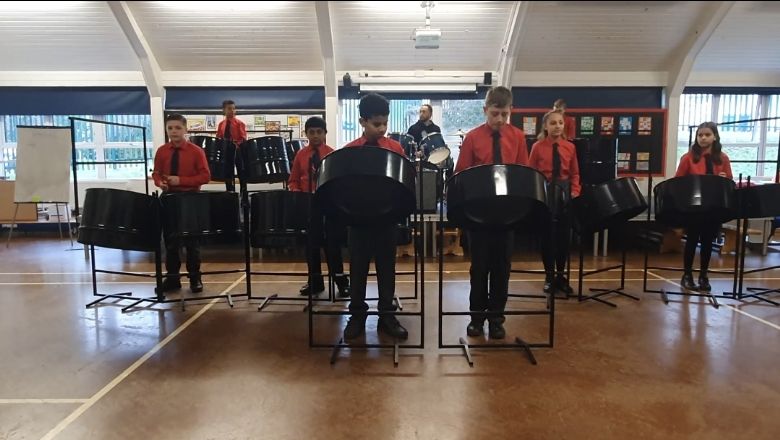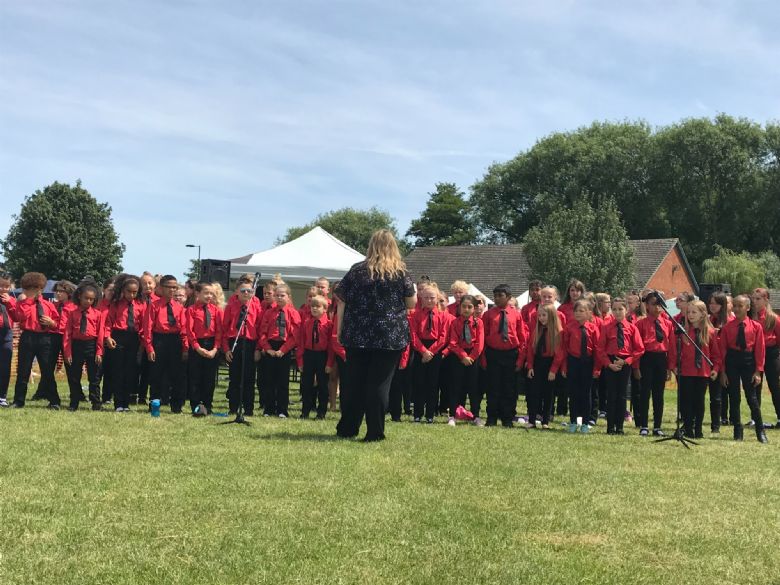Music
The Power of Music and the rationale for Music Teaching at Calcot Schools
We should never underestimate the power of music, it knows no boundaries of language, race or background. It is the universal language – everyone has a soundtrack to their lives.
Julian Lloyd Webber
Music is all around us and is the soundtrack to our lives. For children to grow as musicians they need to experience the world of music in all its richness and depth, with musical knowledge and skills growing through regular inspiring musical opportunities and high quality teaching. Music connects us through people and places in our ever-changing world. It is creative, collaborative, celebratory and challenging. In Calcot School music brings the community together through shared endeavours including whole school singing, celebrations and performances. The sheer joy of music making feeds the soul of our school community, enriching children and strengthening shared bonds of support and trust, building confidence and achieving excellence. Music enables personal expressions, emotional and spiritual development whilst allowing group identity to be established, and encouraging children to strive to achieve their best. Music develops children’s skills in listening, creativity, perseverance and team work that can be applied to all areas of learning.
Curriculum Intent
Music is the language of the spirit. It opens the secret of life bringing peace, abolishing strife.
Kahlil Gibran
At Calcot School music is for everyone. It is the centre of our creative curriculum and all children will have the opportunity to learn about and listen to music, to develop an appreciation of music as an art form, and the reach the highest possible standards through expert teaching and learning opportunities. Music will enrich their curricular experiences and will inspire and motivate children to continue their musical journey as they move to secondary school with enthusiasm and confidence.
 Curriculum Implementation
Curriculum Implementation
A rich variety of musical experiences are part of daily life at school that will inspire children to love music, soothe and energise children in their day-to-day lives. This will be achieved through high quality specialist teaching and using planned experiences that integrate all aspects of musical enjoyment and extend beyond the requirements of the national curriculum.
The 4 areas of the new music curriculum will include: Singing, Listening, Composing and Performing
Singing:
Singing is a great strength at Calcot Schools. Through good vocal production, careful listening and well-developed sense of pitch, pupils can sing in harmony and with musical delivery by the end of Year 6.
The principles below support the teaching of singing across the school:
• Warm ups will help pupils use their voices safely. There are many places to find good
examples of vocal warm ups, and they will typically include vocalising, sirening and
simple scales, as well as games to energise pupils.
• Breathing. Increasing control of airflow will help pupils to sing longer phrases, adjust
dynamics, improve tuning and phrase melodies expressively.
• Posture. A relaxed but stable stance (soft knees) sets the body up to produce an
unforced but well-focused sound. Pupils, especially younger pupils, will often want to
move to the music and this helps to facilitate that.
• Dynamics. Singing should include a dynamic range as a key
expressive tool. Confident singing will often be loud but need not tip over into
shouting.
• Phrasing gives shape to melodic lines. Through small dynamic changes, it helps
emphasise important syllables and create musical interest in the melody.
• Context. Music can often be brought to life by considering the context in which it was
written, or by discussing the meaning of any words.
• Vocal health. Warming up before singing, staying hydrated, resting voices,
particularly when there is lots of singing to do, keeping vocal muscles relaxed
Listening
Listening to music is fundamental to musical understanding. By learning to listen critically, pupils will not only expand their musical horizons but also gain a deeper understanding of how music is constructed and the impact it can have on the listener. Listening to a broad range of music also helps develop other areas of musical activity, including composing and performing. Music is one of the central building blocks of any culture and the shared knowledge of music is crucial cultural capital in understanding where we came from and our place in the world. An inclusive approach to this cultural capital is represented in this document to encourage pupils to be open minded in their listening as well as knowledgeable about the breadth of musical genres in the world today.
Composing
The creative process, with its wide horizons of possibility, gives pupils an opportunity to contribute to musical culture in unique and valuable ways. As pupils move through the Key Stages, they will develop the craft of creating melodies and rhythms and fashioning these into short pieces with structure. Familiarity with music in a range of styles and genres is crucial for developing the aural understanding needed to compose music. The development of a reliable musical memory is a valuable skill for performers and composers. As an integral part of composition work, pupils should practise recalling, e.g., melodic shapes, harmonic sequences, rhythmic patterns and sections of their compositions. Children will compose regularly as part of their weekly practical lessons, creating rhythm patterns and sharing these with others using call and response.
Performing
Creating opportunities to celebrate, share and experience music of all kinds will consolidate music learning for children. The following principles of performance apply across all Key Stages:
Develop stagecraft. Develop a sense of confidence and ownership regardless of the size or nature of the stage or performing/recording space; engage with an audience; respect fellow performers and acknowledge applause.
Consider the programme. The sequence of items should maximise impact and maintain audience engagement. Aim for a clear beginning, middle and end for any performance activity.
Encourage peer feedback. Create an environment where pupils can constructively express their thoughts on performances. This is a valuable way to develop listening skills and musical vocabulary.
Seek out opportunities for collaboration. If more than one class or group is performing, we seek opportunities for children to come together to perform whenever possible.
The children will be taught to:
EYFS and Key Stage 1
Use their voices expressively and creatively by singing songs and speaking chants and rhymes
Play untuned instruments musically
Listen with concentration and understanding to a range of high-quality live and recorded music
Experiment with, create, select and combine sounds using the inter-related dimensions of music.
Key Stage 2
Play and perform in solo and ensemble contexts, using their voices and playing musical instruments with increasing accuracy, fluency, control and expression
Improvise and compose music for a range of purposes using the inter-related dimensions of music
Listen with attention to detail and recall sounds with increasing aural memory
Use and understand staff and other musical notations to support their performing, composing and listening
Appreciate and understand a wide range of high-quality live and recorded music drawn from different traditions and from great composers and musicians
An ability to explore, gain an understanding of and an appreciation of music in a variety of styles, from different times and cultures, with an awareness of chronology
Develop an understanding of the history of music through the listening programme in place
Equal Opportunities, Gifted and Talented Pupils and those with Special Needs
 Every child will be given equal opportunity and access to music irrespective of their ethnic or linguistic background, gender, disability or religious beliefs. Children with Special Educational Needs will have full access to the music curriculum which will be modified to best meet their needs. Those identified as Able, Gifted and Talented in Music will be given opportunities to develop their skills further. Collaboration and the development of children’s, social, moral, spiritual and cultural education will be promoted through music teaching.
Every child will be given equal opportunity and access to music irrespective of their ethnic or linguistic background, gender, disability or religious beliefs. Children with Special Educational Needs will have full access to the music curriculum which will be modified to best meet their needs. Those identified as Able, Gifted and Talented in Music will be given opportunities to develop their skills further. Collaboration and the development of children’s, social, moral, spiritual and cultural education will be promoted through music teaching.
Monitoring and Assessment
The monitoring of music will take the form of classroom observations by specialist staff, monitoring of planning, work scrutiny, interviews with children, learning walks, monitoring of displays and evaluation of performances given. Achievements in music will be reported to parents in children’s annual report and celebrated throughout the year. Assessment will be through continual Assessment for Learning, confidence development and self-assessment by the children reflected in subject questionnaires. The Foundation Stage music is reported as part of their Creative Development.
The Structure of Music Provision
Implementation Whole School – Music Listening Programme – through assemblies and in classtime.
EYFS
Regular musical activities through creative development planned activities
1 x 30mins community singing per week for year 1 and year 2
Daily cross-curricular opportunities for listening
Performance opportunities across the school year
Year 1
1 x 30 min practical class music lesson per week taught by a specialist
1 x 30mins community singing per week for year 1 and year 2
Daily cross-curricular opportunities for listening
Performance opportunities across the school year
Year 2
1 x 30 min practical class music lesson per week taught by a specialist
1 x 30 mins community singing per week for year 1 and year 2
Daily cross-curricular opportunities for listening
Performance opportunities across the school year
Year 3
1 x 45 min practical class music lesson per week taught by a specialist
1 x 30 mins community singing per week for year 3-6
1 x 1hr choir singing per week for children joining this group (G and T have an auditioned choir)
Daily cross-curricular opportunities for listening
School production in Spring term and other performance opportunities during school Arts Week
Year 4
1 x 45 min practical class music lesson per week taught by specialists as part of the Rock Band music project.
1 x 30mins community singing per week for year 3-6
1 x 1hr choir practice every week for children joining this group (G and T have an auditioned choir)
Daily cross-curricular opportunities for listening
School production and other performance opportunities during school Arts Week
Year 5
1 x 40 min practical class music lesson per week taught by specialists to learn the Steel Percussion instruments
1 x 30mins community singing per week for year 3-6
1 x 1hr choir practice every week for children joining this group (G and T have an auditioned choir)
Daily cross-curricular opportunities for listening
School production at Christmas and other performance opportunities during school Arts Week
Year 6
1 x 40 min practical class music lesson per week taught by specialists to learn the Steel Percussion instruments
1 x 30mins community singing per week for year 3-6
1 x 1hr choir practice every week for children joining this group (G and T have an auditioned choir)
Daily cross-curricular opportunities for listening
School production in the summer term and other performance opportunities during school Arts Week
Wider opportunities:
Other Gifted and Talented opportunities and performance opportunities as they arise
Partnership events through Berkshire Maestros (Hub) e.g. The Berkshire Junior Music Festival,
Charity events such as the annual Save the Children Carol Service, Spotlight concerts in the community
Gifted and Talented Steel Panning Orchestra
School Rock project performance
Whole school Carnival where the children perform in their class Steel panning groups and provide the music for the event
Music related after school clubs
Curriculum Impact
Children will:
-
Develop musicianship through the key areas of singing, listening, composing and performing;
-
Develop deep, accurate, wide ranging subject knowledge, skills and understanding in music. They will achieve the highest standards, and have rich opportunities that develop cultural capital and instil ambition and ensure resilience. This will be through exposure to a wide range of music through the ages and from across the world through an extensive listening programme and practical based music curriculum.
-
Understand and explore how music is created, produced and communicated, including through the inter-related dimensions: pitch, duration, dynamics, tempo, timbre, texture, structure and appropriate musical notations.
-
Learn to sing and to use their voices, have the opportunity to learn a musical instrument. This experience will build self-confidence and self-esteem, raising aspirations of achievement in all areas of their lives. Playing and singing together unties children in a shared endeavour, bringing joy and shared excitement.
-
Create and compose music on their own and with others.
Have the opportunity to excel as they progress to the next level of their musical learning journey.
News!
Nursery Spaces for 2,3 and 4 year olds
As of September 2025 we are offering spaces for 2,3 and 4 year olds. Please contact the school office for more information.
Read moreOFSTED 2023
Our schools were inspected in 2023 and both schools were recognised for their excellent drive to provide children with an exciting, broad and balanced curriculum. It was commented upon that as pupils move through the school, there is a wealth of opportunities to enrich their lives, including lunchtime, after-school clubs, arts and sporting events.
Read more


